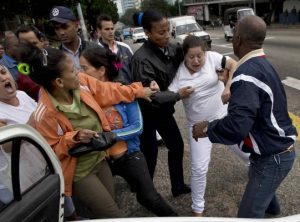
 Cubanet, Roberto Jesús Quiñones Haces, Guantanamo, Cuba, 3 November 2016 — In talking to fellow countrymen and foreigners, the question comes up: Why do we Cubans have put up with so much abuse from the Castros?
Cubanet, Roberto Jesús Quiñones Haces, Guantanamo, Cuba, 3 November 2016 — In talking to fellow countrymen and foreigners, the question comes up: Why do we Cubans have put up with so much abuse from the Castros?
The question is raised because of the discrimination to which we have been, and are still subject, to the existence of a dual currency system, excessive prices for goods and services, and the indiscriminate repression at the slightest sign of dissidence.
But those who ask this question are forgetting inescapable historic circumstances, because the anthropological damage caused to the Cuban people by the Castros has its origins in the Sierra Maestra guerilla warfare and in secrecy. We also should not forget that the Cuban Revolution enjoyed the overwhelming sympathy and support of the people because its political and economic programme was backed up by the restoration of democracy. Measures which, with obvious popular impact in a country where the people, up until then, had been seen as an entelechy, guaranteed an extraordinary level of support for Castroism. Taking advantage of that, it was able to convert the slightest criticism into a counter-revolutionary act, thus legitimising repression “in the name of the people” although those who are repressed are a part of the people.
In April 1961, a group of excited militiamen accepted Fidel Castro’s proclamation of a socialist revolution, “in the name of and on behalf of the Cuban people”, without which nobody would have conceded that right, on the corner of 23rd and 12th (opposite the cemetery in Vedado, Havana). A typical example of manipulation of the masses.
Absolute control of education and the media, subjugating everyone to surveillance, ranging from telephones and correspondence, up to their private lives, making all family or individual advancement indissolubly linked to loyalty to the regime, was, among other practices, sufficient to establish Castro’s rigid control of society. When, in October 1965, the Central Committee of the Cuban Communist Party was created, another leftist dictatorship was politically formalized, which had, de facto, existed since 1959.
Those who dare to stand up to the totalitarian regime pay for it by death in combat, being lined up and shot, thrown in jail, sent into exile, or ostracized.
In the 70’s, the advance guard of a peaceful opposition made itself felt. It began to knit together a new awareness and, although the regime continued to enjoy popular support, the discontent was evident, as was demonstrated at the Mariel embassy and what happened afterwards. (The April 1980 occupation of the Peruvian embassy, the confrontation with the Castro government, and the subsequent mass exodus from the port of Mariel of some 125,000 Cubans to Miami.)
The Special Period was another turning point. (the extended economic crisis from 1989, through the 1990s, following the collapse of the Soviet Union). Progress in the independent civil society was still going slowly, although more visibly. Its protagonists contributed to the revealing of another Cuba, which did not exist in the Cuban official media. Radio Martí, broadcast from the United States, made an enormous contribution to that.
Fidel Castro’s posture, which was to refuse to admit the de facto failure of socialism, which he was faithfully copying, and which was going hand in hand with shortages, the exodus from the country of important cultural, sporting and political figures, the strengthening of the mass exodus of the Cuban people, the emergence of marked social differences and phenomena such as tourist apartheid, decriminalization of the dollar and prostitution, increased popular discontent.
From then on, the civil society began to grow rapidly. The ground they had gained was thanks to their courage and persistence. Repression increased, but because of that, the people know that the police beat up and lock up men and women whose sole offence is to peacefully demand the observance of the human rights, which the Castro regime repeatedly violates on a massive scale.
All of this occurs with the complicity of the State Prosecutor’s Office and the tribunals. The Cuban opposition lacks any rights. Along with the complicity of the state institutions, can be added the no less shameful connivance of numerous governments whose latest cynical act has been to approve Cuban membership of the United Nations Human Rights Council.
Some ask, how much longer? Forgetting that to be a peaceful opposition requires a large dose of humility and courage. Anyone can shoot a policeman in the back, as did the members of Castro’s 26th of July movement, dedicated to overthrowing Batista, or place a bomb in a cinema or public place. If the peaceful opposition started to do that, if they took up arms – if they obtained them even though one of the first measures of the dictatorship was to eliminate arms factories – then Castro and his inevitable front men would go crying to their accomplices in the UN to denounce the “terrorists” and put an end to them with the consent of the governments who praise democracy while they support Castroism.
But it’s just one day at a time. In spite of the defamatory campaigns, the discrimination and abuse, the people are watching. It’s a long-term struggle, but at least the opponents don’t have the death of any other Cuban on their consciences. Their achievement is that they are fighting peacefully, even for the cowards who hit them, discriminate against them, and penalize them.
Translated by GH
